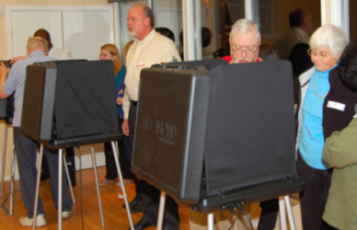Judicial Watch announced that it had settled its lawsuit against the state of North Carolina, Guilford County and Mecklenburg County.
In April 2020, Judicial Watch filed a lawsuit against the North Carolina State Board of Elections, the Guilford County Board of Elections and the Mecklenburg County Board of Elections for failing to make reasonable efforts to remove ineligible voters from their voter registration rolls as required by the federal National Voter Registration Act of 1993. According to the Judicial Watch figures, in 2019 there were more registered voters in Guilford County than adults eligible to register to vote. The state of North Carolina, according to Judicial Watch figures, had a voter registration rate of close to 100 percent of its age-eligible citizens.
According to Judicial Watch, since North Carolina, Guilford County and Mecklenburg County cleaned up their voter rolls, it is dropping the lawsuit.
According to Judicial Watch, the percentage of inactive registrations in Guilford County dropped from 19 percent in 2019 to 11 percent in 2021. The number of registrations removed for failure to respond to an address confirmation and failure to vote in two national elections in Guilford County increased from 7,000 in 2019 to 33,000 in 2021 – an increase of 372 percent.
Statewide the number of registrations removed increased from 220,000 in 2019 to 590,000 in 2021 – an increase of about 168 percent.
In a press release, Judicial Watch President Tom Fitton said, “After we filed our federal lawsuit, North Carolina removed hundreds of thousands of ineligible voters (people who have died or moved away). North Carolina follows Judicial Watch voter roll clean-up success in California, Kentucky, Ohio, and Indiana. And we are right now prepping lawsuits against other states to force them to clean up their rolls.”
North Carolina and Guilford County were not alone in having outdated voter rolls. In October 2020, Judicial Watch released a study that found that 353 counties nationwide had more voter registrations than citizens old enough to vote.


We shall see if it is cleaned up.
Maybe some of them reside in the cemeteries.
Am sure the democrats aren’t happy about this.
Thank God for Judicial Watch!
This is why the democrats tell their constituents to “vote and vote often”
Hopefully,it has been cleaned up!
Democrats’ H.R.1 and H.R.4 Bills will corrupt our elections forever.
They allow the illegal aliens who have invaded America to vote.
They eliminate showing valid photo IDs.
They ban keeping records for audits.
Ballot harvesting should be eliminated.
Ballots counted should not exceed the number of registered voters in the district.
Fair elections may be a thing of the past!
More BS Republican talking points to spread fear that isn’t true. In no way does the bill make it legal for none citizens to vote.
chris you are so full of horse crap
Most cases of voting for dead parents I have ever heard of were republicans?